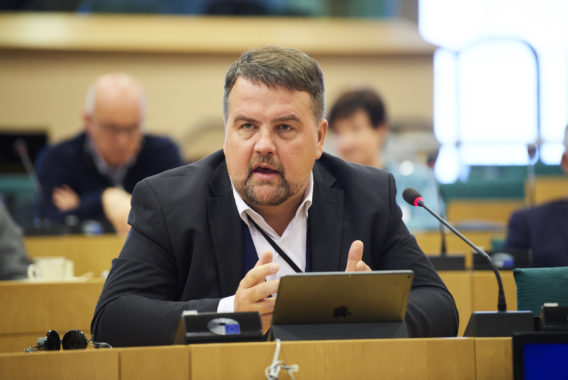Today, on the plenary session of the European Parliament conservatives rejected the resolution on the eurozone’s economic policy, which encouraged modernization of economic management in Europe. Resolution project, on which Ivars Ijabs worked on behalf of the ‘Renew Europe’ group, encouraged innovations to EU’s economy management policy.
MEP’s from parliament’s Committee on Economic and Monetary Affairs prompted that together with EU Member States’ budgetary discipline evaluation, assessments on environmental compliance criteria should be introduced, to show how much a budget promotes the fight against the climate crisis.
‘Unfortunately, conservatives with the support from far-left in essences rejected green course in economy management and dumped the vote in the plenary session of the European Parliament,’ explains Ijabs.
Numerous MEP’s from conservative forces thought that such an approach is so unacceptable, that voted against the resolution altogether. This one of very few examples where a document supported by the Committee on Economic and Monetary Affairs is rejected by the vote on the Plenary session.
Ivars Ijabs who is ‘Renew Europe’ responsible person for the issue, insists that Covid-19 caused an economic downturn, in fact, change current economic and fiscal political dogmas and necessitates to modernize eurozone’s management.
‘Overcoming crisis asks to significantly increase the investments this year and onwards. It asks to rethink attitude towards budget deficit and maximum allowed amount of national debt and to closely link investments to reforms and implementation of a Green Deal. It is important to modernize rules of European economic management,’ insists Ivars Ijabs, who works in Committee on Economic and Monetary Affairs.
‘As it is often the case, this time discussions about overcoming crisis collided with left and right positions. Some insisted on getting rid of all restrictions on spending on debt, others were firmly struck to old fiscal standards and were unwilling to discuss changes in the rules of economic policy. Some insisted on including green criteria in budgetary evaluation, but conservatives did not want to hear it at all.’
Draft approved by the Committee on Economic and Monetary Affairs once again encouraged EU leaders to finance the EU budget from direct EU revenue, and not from Member States payments. These new, green and fair sources of revenue could be the common consolidated corporate tax base, taxes on plastics, carbon taxes, taxes on digital services and financial transactions, and revenues from the emissions trading scheme.
By small majority the Parliament also rejected the ‘Renew Europe’s’ group’s proposal to create a European Union treasury manager to oversee the investments of the European Recovery Funds, thus strengthening the democratic accountability and legitimacy of economic and monetary union.
Draft resolution: https://bit.ly/eirozona2020
Voting results: https://bit.ly/eirozona2020-balso-grozijumi
Video recording of the address during the debate:

